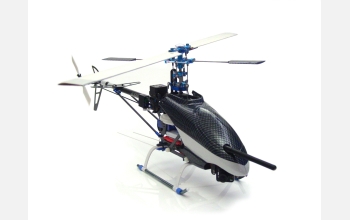|

Media Advisory 05-021
Robotics Researchers Return to Examine Katrina Devastation With Small Unmanned Helicopters

Journalists are invited to join the study team from Dec. 2 to Dec. 4
November 22, 2005
Building upon an earlier search mission using helicopter unmanned aerial vehicles (UAVs), engineering researchers from the University of South Florida (USF) are returning on Nov. 28 to the Mississippi Gulf Coast with their small, radio-controlled aircraft.
The researchers are accepting requests from accredited reporters who wish to join the team to examine damage to multi-story structures still vacant after Hurricane Katrina and to develop new techniques for using UAVs. The researchers will also be testing new optic and range sensors that may help the helicopters operate in the dark.
Robin Murphy, director of the USF Center for Robot-Assisted Search and Rescue (CRASAR), will lead the team and coordinate media participation. Members of the media may embed with the CRASAR team from Dec. 2 through Dec. 4, although the team will stay only as long as necessary to complete their mission. B-roll is available from USF.
The research is sponsored by the National Science Foundation (NSF) in partnership with Jackson State University's National Center for Biodefense Communications and NSF's Safety Security Rescue Research Center, an Industry-University Cooperative Research Center.
Details of the mission, including visuals from the first search effort, can be found in the university press release linked below.
-NSF-

Media Contacts
Joshua A. Chamot, NSF (703) 292-7730 jchamot@nsf.gov
Randolph Fillmore, University of South Florida (813) 974-8476 Rfillmor@admin.usf.edu
Program Contacts
Rita V. Rodriguez, NSF (703) 292-8950 rrodrigu@nsf.gov
Alex Schwarzkopf, NSF (703) 292-5359 aschwarz@nsf.gov
Principal Investigators
Robin Murphy, University of South Florida, SSRRC, CRASAR (813) 974-4756 murphy@cse.usf.edu
Related Websites
USF Press Release: USF mini-helicopters go "Back to Katrina": http://usfnews.usf.edu/page.cfm?link=article&aid=1111

The National Science Foundation (NSF) is an independent federal agency that
supports fundamental research and education across all fields of science and
engineering, with an annual budget of $6.06 billion. NSF funds reach all 50
states through grants to over 1,900 universities and institutions. Each year,
NSF receives about 45,000 competitive requests for funding, and makes over
11,500 new funding awards. NSF also awards over $400 million in
professional and service contracts yearly.
 Get News Updates by Email Get News Updates by Email
Useful NSF Web Sites:
NSF Home Page: http://www.nsf.gov
NSF News: http://www.nsf.gov/news/
For the News Media: http://www.nsf.gov/news/newsroom.jsp
Science and Engineering Statistics: http://www.nsf.gov/statistics/
Awards Searches: http://www.nsf.gov/awardsearch/
| 

